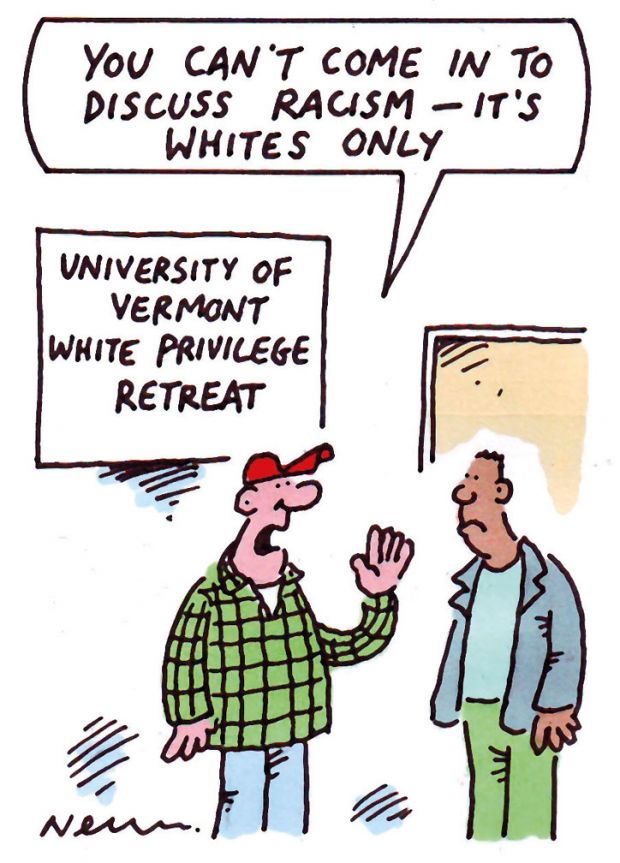
The University of Vermont held a three-day retreat to allow students who “self-identify as white” to confront their own “white privilege”. “Examining White Privilege: A Retreat for Undergraduate Students Who Self-Identify as White” was “specifically for white students”, Campus Reform reported on 18 November. The self-identifying white students “tackled tough questions such as ‘What does it mean to be white?’ and ‘How does whiteness impact you?’” The university website features testimonials from past attendees of the retreat, who praised it for being a “safe space”, the publication added. An “examining common sense” retreat for the organisers might be in order.
The University of Cambridge has taken a fundraising video fronted by historian David Starkey offline after staff and students complained that it would hinder attempts to make the university “open to the very best and brightest regardless of anything except their academic potential”, given his past comments on race. “Cambridge has suspended the video, part of a campaign to raise £2 billion, by marking it as private on YouTube,” reported The Guardian on 19 November. An open letter to the university signed by “hundreds” of staff, students and alumni cited Professor Starkey’s appearance on the BBC’s Newsnight after the summer riots of 2011, in which he said: “A substantial amount of the chavs have become black. The whites have become black; a particular sort of violent destructive, nihilistic gangster culture has become the fashion.” Professor Starkey, who studied at Cambridge, said that he would “reserve the right to comment freely but without recrimination”. That includes, presumably, further comment on subjects about which he knows very little.
The University of York has been accused of giving in to “mob rule” after it cancelled plans to mark International Men’s Day in the wake of allegations of sexism, the BBC News website reported on 18 November. York’s original support for the mental health awareness day, which took place on 19 November, sparked controversy by drawing attention to the under-representation of men among its students and some parts of its faculty. But the university’s statement was denounced as “crass” by an open letter, signed by more than 200 people, to the university’s registrar, David Duncan, while critics branded its implication of an anti-male hiring bias as “grossly irresponsible”. However, York’s decision to withdraw its statement and support for International Men’s Day sparked its own furore, with 1,000 people signing a petition calling for the event’s return. Glen Poole, the UK coordinator of the event, said he was “deeply saddened” by York’s actions, saying activists who prompted the retraction “have put their personal gender politics ahead of their compassion for men and boys in crisis and distress”.
A University of Bristol lecturer walked out of a lecture over offensive comments posted on a social media site, the Bristol Post reported on 21 November. Hélène Turon, a reader in economics, berated a group of first-year students over anonymous posts made on the Yik Yak site, which included sexual innuendo, the paper said. Dr Turon told The Tab, an online student news site, that there was a “difference between public and private gossip” and that its story should reflect on “what the appropriate amount of respect students should have for staff and fellow students is”, the Post said. The university said that it “takes all instances of cyberbullying very seriously, whether the victim is a student or a member of staff” and that any students involved would be “dealt with under our disciplinary procedures”.
Asking students to attend lectures at 9am is akin to “torture” because of their circadian rhythms, one sleep expert recently suggested. So spare a thought for undergraduates in the 1600s, whose academic day began at 5am and often finished at 9pm. The gruelling student day was revealed by archivists at the University of Aberdeen, where strict rules in 1641 included “dressing gravely and neatly…and acting with ‘sporting, modesty and gentleness’”, Aberdeen’s Evening Express reported on 22 November. The university, then known as King’s College, employed a “standards enforcer” known as a “Hebdomader” to make sure that students did not step out of line and were hard at study early in the morning. Those students demanding more contact hours with staff should be careful what they wish for.
Register to continue
Why register?
- Registration is free and only takes a moment
- Once registered, you can read 3 articles a month
- Sign up for our newsletter
Subscribe
Or subscribe for unlimited access to:
- Unlimited access to news, views, insights & reviews
- Digital editions
- Digital access to THE’s university and college rankings analysis
Already registered or a current subscriber? Login